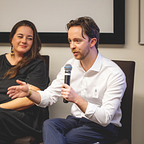Form vs. Nature
How a video game taught me my greatest lesson of 2022.
Last year, God of War: Ragnarok came out and swept basically any award ceremony it was entered in. It had some fierce competition, with what many are calling the game of the Decade also coming out last year; Elden Ring. There were also some honourable mentions with the likes of Stray and Horizon: Forbidden West.
This post isn’t about how good of a game Ragnarok is (but it is awesome), or even about any story or gameplay element in the game at all. It’s about a couple of small lines of dialogue that have wormed their way so deep into my brain I need to write a blog about it.
This dialogue doesn’t give away any spoilers for the plot — it’s not even in a cutscene. This is basically a throwaway line that’s designed to pad out the world-building and lore, while enriching the backstory for one of the side characters. Let me paint the scene a bit.
Brok — a curmudgeonly but loveable blacksmith dwarf — is helping our protagonist Kratos with a quest. As they’re moving about between battle sequences, he says…
“See, dwarven magic’s all about the intangibles. The relationship between the stuff what you can touch, and what you can’t. It’s about understanding […] The Nature of the thing is more important than the form of the thing.”
It comes up once or twice more on this quest, and then never again. But these words have been stuck in my head for over a month now — and it’s shaping how I see the world.
Let me explain with a few examples:
Applying a new perspective
Solving a user’s problem
If I’m responding to a user as a customer support agent, it’s easy to look at a ticket that’s just come in an answer the question that’s been asked. I can do that X amount of times, and clock out for the day; satisfied that I’ve done my job. That’s looking at the form of the thing. What happens if I look at the nature?
I start to consider who the user is; how many times they’ve written in, what they tend to ask about, what they do frequently vs. what they’ve never done in our app. I answer their question, but I also suggest some things they could do that might help them accomplish what they’re really looking to achieve.
In Leadership
I do a few things with a Leadership Ecosystem called Collective Intelligence — and in a lot of contexts, we find ourselves saying ‘the problem isn’t the problem.’ Members will often ask their teams for advice on one thing, and leave with no advice on that topic; but instead on something entirely different. Something more important. This is because there’s a culture of looking to the nature of the thing in CQ — not just the form.
In your own work
Another example might be found in your own work — Often times, the form and nature of our jobs are different. Think about what’s in your Job Description vs. what you do day to day. Think about who your direct report is, vs. all the people you help in a given week.
The purpose you serve in your team or organisation likely has a lot of elements that aren’t expressed; Some of these might be a result of you raising your hand to do something that you didn’t have to do. Some might be because a new responsibility came to light in the organisation, and your skills most closely matched what was required.
People who make an outsized impact in a team don’t just raise their hands for every single opportunity. They look into the nature of their role, and fulfil that purpose with focus.
Ultimately — form and nature both matter. They both have an impact on how something exists in the world. But understanding that both exist, and when to use either, is a skill that I think is worth honing. It feels like we often default to examining form — and narrow our world view as a result. God of War is an awesome game — and it’s helped me look beyond the form of things.
Here’s a clip I found of the dialogue that kicked this whole thing off for me:
If you liked this read, you might also enjoy some other posts I wrote ages ago that have a similar flavour:
- 🐑 Measuring the Impossible
About leveraging strong correlations to measure what you otherwise can’t - 🔮… And then what?
Exploring second order effects & how to think ahead
